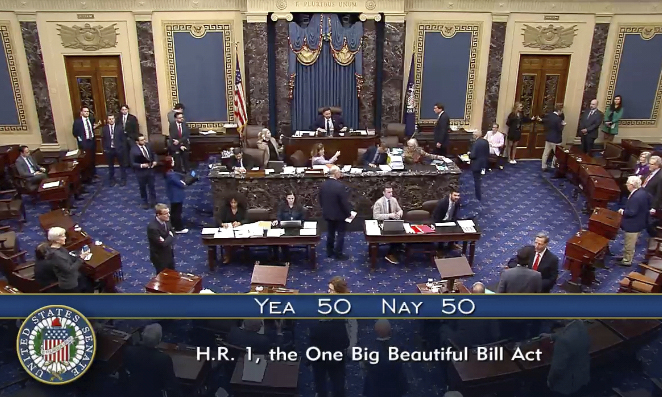President Trump’s One Big Beautiful Bill Act Passes Senate Hurdle
President Trump’s One Big Beautiful Bill Act has successfully advanced through the Senate, clearing a significant legislative hurdle with the crucial support of Vice President Vance, who cast the tie-breaking vote. The bill now returns to the House of Representatives, setting the stage for further debates and potential modifications.
Key Takeaways from the Senate Vote
- Final Vote: The Senate approved the legislation with a narrow 51-50 margin.
- Vice President’s Role: Mr. Vance exercised his authority to break the tie following an extensive 27-hour voting marathon on various amendments.
- Following the vote, President Trump expressed his satisfaction, stating, “Wow, music to my ears.”
Opposition from Republican Senators
Notably, three Republican senators diverged from party lines, voting against the bill:
- Thom Tillis
- Rand Paul
- Susan Collins
Overview of the One Big Beautiful Bill Act
The One Big Beautiful Bill encompasses several key components of President Trump’s agenda, including but not limited to:
- Permanent Tax Cuts: The legislation aims to make the tax reductions implemented in 2017 a permanent feature.
- Border Security Funding: It allocates $46.5 billion for border wall construction and $29.9 billion for Immigration and Customs Enforcement.
- Missile Defense System: Details the proposal for the administration’s Golden Dome missile defense system, securing $25 billion for its development.
- Medicaid Work Requirements: Introduces an 80-hour monthly work requirement for able-bodied adults under 65 receiving Medicaid benefits.
- Medicare and ACA Cuts: Anticipates reductions of $170 billion in "waste, fraud, and abuse" from Medicare and the Affordable Care Act.
- Rollback of Clean Energy Tax Credits: The bill aims to reverse elements from President Biden’s Inflation Reduction Act, potentially saving $488 billion.
Financial Implications
The total spending cuts projected by the bill stand at roughly $1.5 trillion. However, it has drawn considerable criticism from conservative factions within the Republican Party who argue that it does not sufficiently address spending cuts.
Concerns Raised by Critics
The Congressional Budget Office forecasts that the legislation could contribute an additional $3.3 trillion to the deficit over the next decade. Elon Musk, former leader of DOGE, characterized the bill as “utterly insane and destructive,” suggesting it could “destroy millions of jobs in America.” In a provocative rebuttal, President Trump indicated he would “look” into the possibility of deporting Musk.
Key Republican Opponents
- Thom Tillis: Expressed concern over the cuts to Medicaid and announced he would not seek re-election.
- Rand Paul: Objected to the bill largely due to the planned increase in the debt ceiling.
- Susan Collins: Voiced worries regarding the proposed Medicaid cuts.
Next Steps for the Legislation
As the One Big Beautiful Bill Act heads back to the House, the fate of the legislation remains uncertain. With Republicans holding a slim majority, at least six members have threatened to oppose the current version due to revisions made in the Senate. Key issues being discussed include:
- Medicaid Cuts: Numerous lawmakers have raised alarms about proposed reductions to Medicaid.
- Insufficient Spending Cuts: Some Republicans believe the bill falls short of true fiscal conservatism.
Conclusion
The One Big Beautiful Bill Act embodies a significant chapter in President Trump’s legislative efforts but faces an uphill battle in the House. Observers will closely watch the discussions surrounding the bill, particularly concerning the contentious Medicaid cuts and the impact on the Republican caucus in 2024.
For further details on the implications of this legislation, visit Congress.gov for official updates and analyses.


